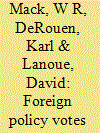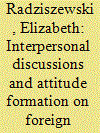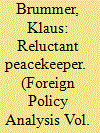|
|
|
Sort Order |
|
|
|
Items / Page
|
|
|
|
|
|
|
| Srl | Item |
| 1 |
ID:
119674


|
|
|
|
|
| Publication |
2013.
|
| Summary/Abstract |
This paper explores the role of foreign policy votes on presidential support in Congress. We postulate that a selection effect is inherent in this topic. Failing to consider that certain factors will influence whether a president takes a position on an issue in the first place can yield misleading results. For instance, presidents might not take positions during lame duck years or when their popularity is low. They might be more willing to take positions on international votes, votes requiring super majorities, or those that take place during a honeymoon period. In turn, this decision regarding position-taking can bias the outcome. We also capture the relationship between Congress and public opinion in our models as it is important to consider that the Congress is listening to its constituents as well. If the public identifies international problems as the most important to the nation, Congress might be more willing to vote in favor of the president on international votes. Testing key vote data from 1953 to 2003 for each chamber, we show that presidents are more likely to take positions if the vote is international, if the public identifies the "most important problems" as international ones, and if the vote requires a super majority for passage. They are less likely to take positions if they are up for reelection and are lame ducks. In turn, international votes, the percentage of the public identifying international problems as the most important, and the size of the president's majority have positive effects on presidential support. These findings are obscured if selection is not taken into account.
|
|
|
|
|
|
|
|
|
|
|
|
|
|
|
|
| 2 |
ID:
119676


|
|
|
|
|
| Publication |
2013.
|
| Summary/Abstract |
This paper examines Polish support for the country's participation in the Iraq war in 2004. I argue that interpersonal discussions are a driving force behind emergent attitudes on foreign policy, such as support or opposition to war. I identify three mechanisms through which political discussions can influence individual's views on the war and develop hypotheses about the impact of kinship ties and frequency of discussions on strengthening the influence. I test my argument using the first large-N data on interpersonal discussions and foreign policy outside of the US context. Findings demonstrate that having a pro-war conversation partner greatly increases the probability that one will adopt similar views. They also show that when one's social environment is taken into account as the source of information about the policy, the impact of mass media diminishes.
|
|
|
|
|
|
|
|
|
|
|
|
|
|
|
|
| 3 |
ID:
119670


|
|
|
|
|
| Publication |
2013.
|
| Summary/Abstract |
This article addresses the ambiguity of the governmental politics model (GPM) concerning the selection of policy options by political actors. It argues that the GPM's core proposition in this respect ("Where you stand depends on where you sit") can be conceptualized by integrating its substantive claims into the two-stage process of the poliheuristic theory of decision making (PH). This is accomplished through the introduction of a "noncompensatory organizational loss aversion variable" in the first stage of PH, according to which decision makers reject all options that are unacceptable for their organization irrespective of their benefits in other decision-making dimensions. In the second stage, the decision makers scrutinize the remaining options more thoroughly with respect to several decision dimensions, including organizational interests. This article uses Germany's decision to participate in EUFOR RD Congo, a military operation of the European Union in the Democratic Republic of Congo (DRC), to probe the plausibility of the revised GPM.
|
|
|
|
|
|
|
|
|
|
|
|
|
|
|
|
| 4 |
ID:
119673


|
|
|
|
|
| Publication |
2013.
|
| Summary/Abstract |
To further explore the impact of strategic culture on foreign policy, this article examines the development of the "Rogue Doctrine" within US strategic culture following the Cold War. Critics allege that this doctrine constrains strategic choice resulting in aggressive policies toward alleged rogue states. To assess the impact of this security narrative, the operational codes of two US presidents, William J. Clinton and George W. Bush, are examined. Analysis reveals distinct differences between their perceived interactions with rogue and nonrogue states. The resulting interactions manifest the unique nature of US-rogue state interactions as these US leaders possess starkly different images of both rogue others as well as self. In the context of dealing with rogue states, these leaders' perceptions of self undergo major transformations indicating tendencies toward more aggressive tactics and the use of force.
|
|
|
|
|
|
|
|
|
|
|
|
|
|
|
|
| 5 |
ID:
119671


|
|
|
|
|
| Publication |
2013.
|
| Summary/Abstract |
The Tea Party is a powerful new force in American domestic politics, but little is known about its supporters' views on foreign affairs. New survey data indicates that supporters of the Tea Party exhibit attitudes on international relations consistent with the Jacksonian tradition in American political thought but not, as some have maintained, isolationist opinions of the Jeffersonian variety. Jacksonians are supporters of a strong defense and a large military presence abroad and are opposed to Wilsonian global idealism. The article operationalizes support for these three different foreign policy traditions by connecting them to previous findings on the structure of American foreign policy. The effect of Tea Party affiliation on foreign policy attitudes is severely weakened, however, once we control for political ideology, particularly economic conservatism. As is the case in domestic politics, Tea Party sympathizers seem to be somewhat ordinary conservatives, not a completely new breed. There is a direct parallel between their domestic attitudes and their foreign policy attitudes. Their lack of support for idealistic policies abroad, their most prominent set of attitudes, is part and parcel of a lack of social solidarity indicated in their more economically libertarian position at home.
|
|
|
|
|
|
|
|
|
|
|
|
|
|
|
|
| 6 |
ID:
119672


|
|
|
|
|
| Publication |
2013.
|
| Summary/Abstract |
The article brings together two cognitive approaches to the analysis of foreign policy: salience and metaphor analysis. Issue salience and metaphors relate to cognitive heuristics that speak to different aspects of the cognitive representation of foreign policy problems which complement each other: the concept of salience looks at the priming of issues in the foreign policymaking environment; metaphors relate to the framing of these issues. The article shows how both cognitive concepts can help the other address individual blind spots. While analyzing the salience of foreign policy issues tells us what issues actors attend to, metaphor analysis can shed light on how they frame these issues and indicate what policy options are made possible. At the same time, salience can help metaphor analysis identify why certain metaphors resonate better in public discourse than others. To briefly illustrate the potential of thinking salience and metaphor analysis together, the article looks into the British public debate about international terrorism and the "war on terror".
|
|
|
|
|
|
|
|
|
|
|
|
|
|
|
|
|
|
|
|
|